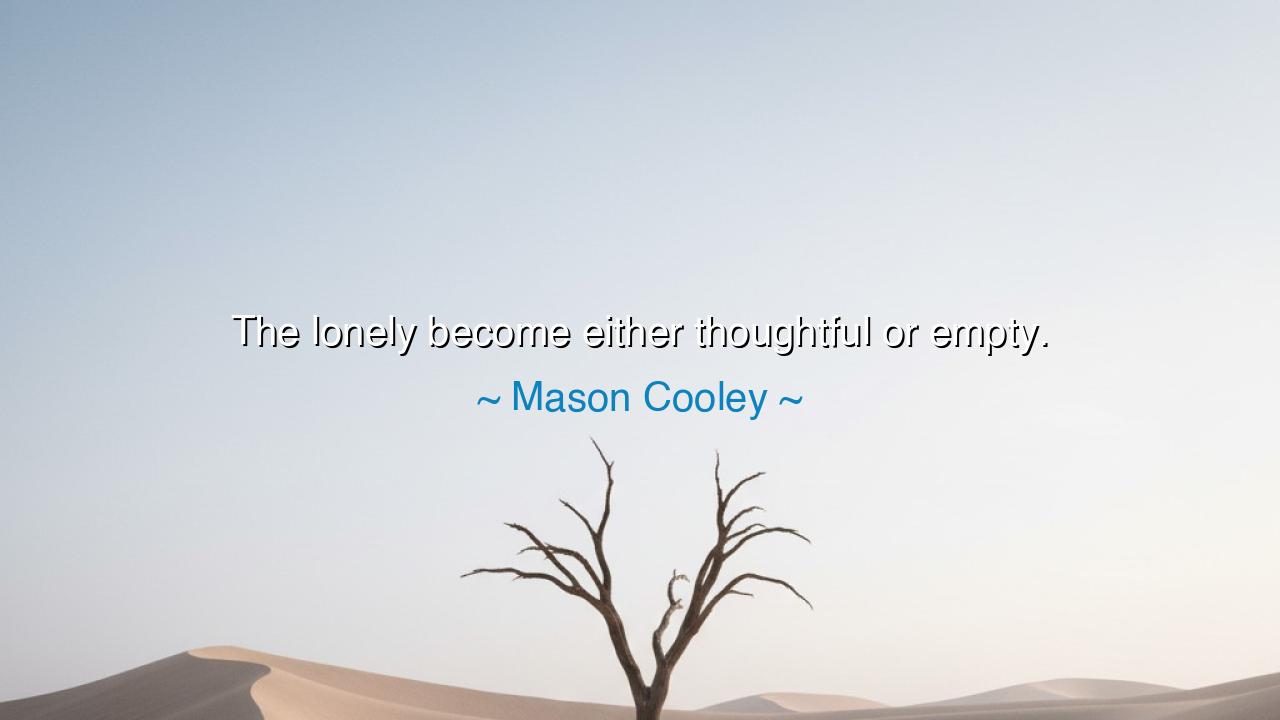
The lonely become either thoughtful or empty.






“The lonely become either thoughtful or empty.”
Thus spoke Mason Cooley, a philosopher of subtle insight, whose aphorisms cut through the noise of modern life like a quiet blade. In this brief yet profound statement, he captures one of the oldest truths of the human heart — that loneliness is a crucible, a fire that refines or destroys. When the soul finds itself alone, it faces a great choice: to turn inward toward reflection and growth, or to sink into numbness and despair. For solitude is never neutral — it shapes those who endure it, either elevating the spirit into wisdom or hollowing it into nothingness.
To be lonely is to stand before a mirror that shows not the face, but the soul. In that silence, all distractions fall away, and one is left with the company of one’s own thoughts. For some, this becomes the beginning of understanding — the awakening of insight, the flowering of compassion. Such souls become thoughtful, for they use loneliness as the soil in which reflection grows. But for others, that same silence becomes unbearable. Without faith, purpose, or self-knowledge, they turn away from the mirror, and what could have been depth becomes emptiness. The same solitude that births wisdom can also breed desolation; it depends on how the heart receives it.
The ancients understood this well. The Stoic philosopher Seneca, exiled and alone, wrote letters of profound moral strength that have endured for two thousand years. In his solitude, he found not sorrow but serenity, using isolation as a forge for philosophy. Yet contrast this with the story of Nero, his former pupil — a man surrounded by pleasure, power, and people, yet hollow within. Though surrounded by noise, Nero’s heart was empty, for he never learned to be alone. Thus, Cooley’s truth spans all ages: loneliness is not measured by company, but by the condition of the soul within it.
Consider also the poet Emily Dickinson, who lived much of her life in quiet isolation, rarely venturing beyond her home. To the world, she may have seemed consumed by loneliness, yet within her solitude, she crafted some of the most luminous poetry ever written — verses that burn with awareness and compassion. She chose the path of thoughtfulness, turning her solitude into creation. Through her example, we see that the lonely are not doomed to despair; rather, they are given the chance to turn their inner silence into art, understanding, and light.
But when loneliness is met with fear or self-rejection, it breeds the opposite. Those who cannot face their own reflection fill the void with distraction — endless noise, hollow pleasures, and false companionship. Their solitude does not become silence but emptiness, and they wander through life as though half-asleep. The empty are not evil, but lost; they have fled from themselves and forgotten how to listen to the quiet wisdom of their own hearts. Cooley’s words remind us that loneliness, left untended, becomes not a teacher but a thief — stealing meaning from existence and leaving only apathy behind.
Yet this quote is not a lament, but a call to awakening. It teaches us that loneliness can be a sacred trial — a test of what we will do when the world grows silent. The wise use that silence to grow thoughtful, to seek understanding, to nourish the mind and spirit. They turn loneliness into solitude — a chosen state of inner strength rather than one of exile. The unwise flee it, filling their days with noise until their inner light fades. Thus, the difference between being thoughtful and being empty lies not in circumstance, but in courage — the courage to face oneself.
The lesson of Cooley’s words is clear: when loneliness visits you — as it does every soul — do not reject it. Welcome it as a teacher. Sit quietly and listen to what it reveals about your heart. Read, write, create, pray, reflect — anything that turns your solitude into growth. Do not let silence become void; fill it with meaning. For every person must learn to dwell with themselves before they can dwell wisely with others.
So remember, my child of the future: loneliness is not your enemy. It is a mirror, a test, a seed. If you embrace it with awareness, it will make you thoughtful — rich in understanding, deep in compassion, strong in spirit. But if you run from it, it will make you empty, hollow as a shell. Choose, then, to be among the thoughtful, for in learning to befriend your own solitude, you will find not emptiness, but the boundless fullness of life itself.






AAdministratorAdministrator
Welcome, honored guests. Please leave a comment, we will respond soon